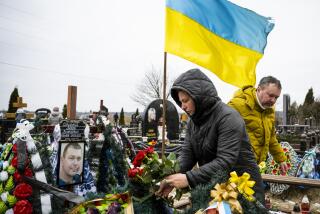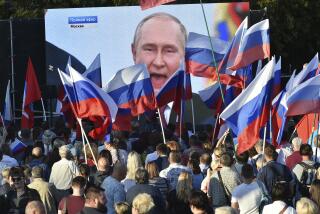Soviet Collapse Likely, Bush’s Aides Conclude : Breakup: Some officials believe the U.S. ultimately may be better off if the nation ceases to exist.
- Share via
KENNEBUNKPORT, Me. — While determined not to undercut Soviet President Mikhail S. Gorbachev as he struggles to salvage a national union, senior advisers to President Bush have concluded that the collapse of the Soviet Union is all but inevitable, Administration officials said Tuesday.
The advisers stopped short of warning that the breakup would be the “catastrophe” of which Gorbachev has warned. But they are understood to fear that the end of the Soviet empire could cause severe economic hardship and, at least in the immediate aftermath, kindle political conflict.
“The view is that the Soviet Union is going to fall--that (it) is going to be unstable,” one Administration official said after a morning session in which the President huddled with his closest national security advisers.
According to those familiar with the discussions, White House officials now believe that, despite Gorbachev’s last-ditch efforts, several republics that have been core elements of the Soviet Union since shortly after the Russian Revolution now will seek to secede.
Nevertheless, as the Administration begins to contemplate a newer world order in which the Soviet Union is not merely a compliant partner but perhaps ceases to exist at all, some officials believe that the United States ultimately may be better off.
“This would leave Soviet ideology devalued once and for all,” one Administration official said. “And in the long run, that offers a greater facility for order.”
The private assessments by senior Administration officials, who spoke on condition of anonymity, came as the White House maintained its public caution and delayed once again its expected announcement granting formal recognition to the breakaway Baltic republics.
Robert S. Strauss, new U.S. ambassador to the Soviet Union, left little doubt that Bush would take that step Friday. But in holding back once more, the President seemed determined to do nothing that might undermine Gorbachev’s bid to preserve his union.
“There’s no question that it’s difficult to manage these changes and they’re having difficulty doing it,” Strauss said after meeting with Bush and other top Administration officials. In vowing U.S. support for Gorbachev and his partner in power, Russian Federation President Boris N. Yeltsin, the ambassador said that it is important “not to create more problems for them than we solve.”
Administration officials and other experts have said that the Soviet Union would effectively cease to function if its core republics break away and form separate states, each with its own currency, military forces and foreign policy.
In his public remarks, Strauss maintained the cautious Administration stance that it would be “foolish” to predict whether the Soviet Union would survive. But the ambassador acknowledged wryly that his new job “may have a lot less geography involved.”
With Moldova now joining the Ukraine, Georgia and Byelorussia in the rush toward independence and some southern republics making secessionist noises as well, the private discussion at Bush’s vacation compound here is said to have addressed the problems that a breakup of the empire would pose.
Among the most troublesome immediate consequences, senior officials were understood to warn, would be the formation across Eastern Europe of a new band of nations that have little chance of economic self-sufficiency.
The three Baltic states of Lithuania, Latvia and Estonia in particular amount to an “economic basket case,” one Administration official warned. Without massive economic assistance that would burden the rest of Europe and the world, the official said, “they simply can’t survive.”
Another potential problem is the ethnic tensions that have long caused some republics to look with mistrust upon their neighbors--and divided others against themselves.
One official, describing a development that “made my palms sweat,” cited a warning from the Russian Federation to adjacent republics Monday that it would not permit them to secede from the union, taking areas with large Russian populations with them.
The leader of neighboring Kazakhstan immediately warned that such a policy could touch off conflicts between the republics, and some Administration experts fear that such turmoil may be impossible to avoid amid the trauma and chaos of an unwinding empire.
In a sign of that apprehension, U.S. officials expressed concern Tuesday about the thousands of short-range, nuclear-tipped rockets and artillery shells that are dispersed throughout the Russian Federation and the Soviet Union’s smaller republics.
U.S. analysts are confident that the strategic weapons remain under tight central control. But because the short-range tactical systems are easily moved and concealed, U.S. officials are far more concerned about their fate as the unraveling of the union progresses.
“Tactical nuclear forces are a different problem,” Pentagon spokesman Pete Williams said, making clear that they lie at the center of U.S. concern. “They are, by definition, highly mobile.”
A senior Pentagon official said that the Soviet military has begun to move some of these weapons into storage depots in the Russian Federation. But many more are dispersed throughout the independence-seeking republics on the periphery, and some are in the hands of Soviet troops remaining in eastern Germany.
U.S. officials said Tuesday that control of the Soviet nuclear arsenal “had returned to its normal state.” But Pentagon spokesman Williams said that U.S. and Soviet officials have not had direct discussions about the security of the Soviet nuclear weapons stockpile, estimated at nearly 30,000 individual weapons, since the failure of last week’s coup.
Another high-placed source said that silence reflects a recognition of the deep sensitivities that surround the question of nuclear control. “You can’t very well ask them who’s got his finger on the button,” the official said.
About 80% of the Soviet Union’s total force of long-range nuclear weapons--including intercontinental ballistic missiles, submarine-launched missiles and long-range bombers--are believed by U.S. intelligence analysts to be based in the Russian Federation.
But a full quarter of the ICBMs remain in silos in the Ukraine, in Byelorussia and Kazakhstan, Williams said. At the same time, half the long-range nuclear-capable bombers are based at airfields in the Ukraine and Kazakhstan.
Byelorussia and the Ukraine have declared their intention to seek independence from Moscow, and Kazakhstan, the nation’s second-largest republic, has withdrawn its support from the treaty proposed by Gorbachev as a means of holding the Soviet Union together.
The prospect that collapse would result in the immediate creation of new nuclear states was described within the Administration as a matter of concern. But officials said that the degree to which the collapse of the center in the Soviet Union is likely to plunge the region into turmoil remains a subject of some debate.
Even those fearful of flare-ups in the wake of a Soviet collapse and wary of the danger that such problems could spill over into Eastern Europe are understood to be sanguine about the prospect for order in a world in which the Soviet Union is diminished if not dissolved.
Now that the Soviet Union and communism are discredited, this consensus holds, U.S. foreign policy will be less often troubled by those who seek to re-create their own nations in the Soviet model.
More to Read
Sign up for Essential California
The most important California stories and recommendations in your inbox every morning.
You may occasionally receive promotional content from the Los Angeles Times.










